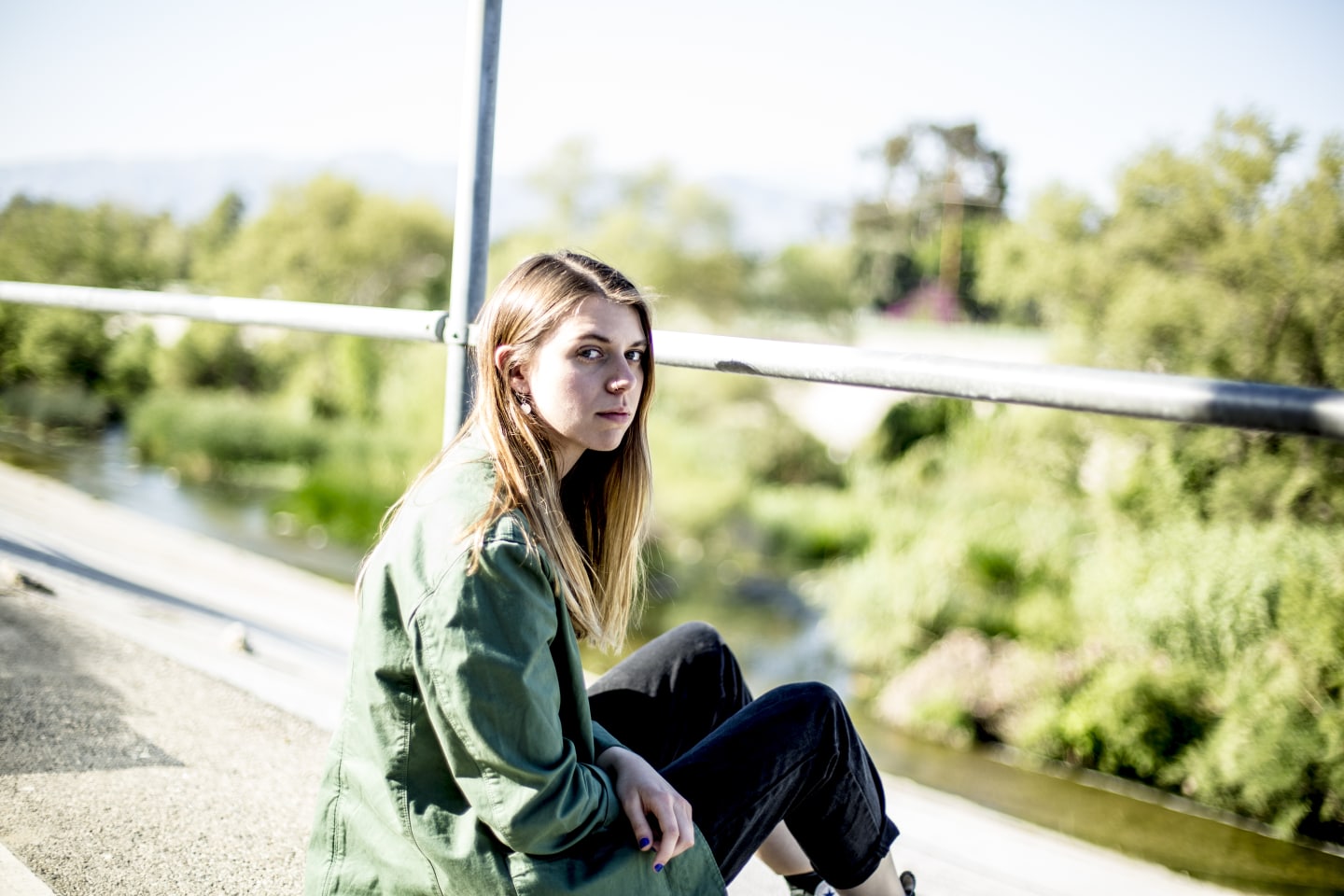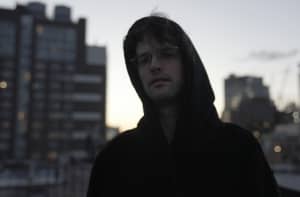 Philip Cosores
Philip Cosores
“What’s the point in pretending things aren’t hard?”
Sarah Beth Tomberlin asked me that recently, over the phone from her apartment in Louisville, Kentucky. The question was rhetorical — we had been discussing her decision to be as honest as humanly possible on the haunting, folk-ish slow songs that she releases as Tomberlin. It may sound like a simple concept, but telling the whole truth can be tricky — especially when you’re a homeschooled pastor’s daughter who was raised in an extremely religious Baptist household, and the whole truth includes lyrics like “I always hated church.”
“That whole culture was a really big part of my life and it is definitely really odd to sing about these things — it makes me really anxious," the 23-year-old explained. "I don't want to disappoint anybody, but I also know I can't worry about that.” That conscious vulnerability manifests gorgeously on “Seventeen,” a heart-wrenching love song from her first full album, At Weddings. The ten-song record comes out in August on the Omaha indie label Saddle Creek.
The video for "Seventeen" — a lovely, simple, slow-motion affair starring Sarah Beth and her dog — is debuting here today. Watch it below, then read our full conversation about growing up Christian, searching for art that resonates, misunderstanding (Sandy) Alex G lyrics, and more.
When did you first start getting into music?
There was no defining moment. It was always around growing up. Around the house, in church — all the things. It was just kind of like, normal. My two sisters are really great singers. I took piano lessons when I was younger. I can play by ear, so I was never very good at lessons. I would fake-read the music.
I know that some of your very first CDs were by Bright Eyes and Dashboard Confessional — and that you had to hide them from your parents.
I wasn't allowed to listen to music that wasn't Christian contemporary, like Relient K. My parents were always around, and they would ask us what we were buying; they wanted to help us select things. When I would go visit my cousin Melody, who lived just outside Atlanta, I would have her load her whole iTunes library on my iPod. I have her to thank for a lot. She was super into Dashboard Confessional and the normal indie stuff that was floating around at the time.
Were you parents strict in other ways, too?
Honestly, I wouldn't view it as strict. A lot of people probably would, but to me it was just normal. They were cautious. I think that every parent is doing the best that they can, generally. But I don't think I always felt that way. When you're growing up, once you kind of realize you're in a small bubble, you're like, This isn't what I would envision for myself. But overall, I think that they did what they thought was a good idea. It wasn't harmful to me and I'm not upset about it; if the worst thing in my life was hiding a Bright Eyes CD, then that's not too bad.
In a way, it probably saved me from a lot of boring-ass music. Because I wanted it so much, when I started to be able to select what I was listening to, I think I just found stuff that I liked — and understood, and related to — really, really quickly. Stuff like Arcade Fire's Neon Bible — that album wrecked me. You find things that make sense for you and that affirm your experience. It helps you figure out good questions to ask and good things to be upset about.
Did you find yourself questioning things from a young age?
Oh yeah. It's not like my parents were forcing me to be Christian, but it was all around me all the time. As you get older, when you're interacting with the world, you might realize that you interact with it in a different way than how you were raised. I think that's a general thing, regardless if it's tied to religion. But with Christianity there were things that I couldn't reconcile. For me it was like, I know all these ideological truths that should comfort me — but they didn't seem comforting. A lot of it was confusing.
My parents raised me to be a critical thinker, so I think it's pretty normal that I responded to Christianity in the same way. I don't understand people who feel the same way about something their whole life. You learn as you grow. You should be questioning everything around you.
Do you think church music has informed your songwriting sensibilities?
Hymns really influenced me. At the first church that my dad pastored at — a small country church — we sang a bunch of older hymns. You're singing crazy stuff like "I was sinking deep in sin / far from the peaceful shore," but it sounds like this "Yay!' song — [the music] is so opposite from what you're saying. I realized it's kind of fun to sometimes do that with music — to have conflicting melodies. I think that's why I really loved Joanna Newsom when I found her; all of her music could be in the Bible. There's hardly a repeated word. I don't really like writing choruses. I like writing in a way where the verses carry the song, like a story.
How does it feel to use techniques that you first practiced in church to sing about struggling with religion?
When [the first song from my album came out], I was in Illinois where my parents live. I hadn't seen them in a while, and my younger sister wanted to see me. I got there and I was like, “I have to post some stuff in the morning,” and my parents were like "Oh, our WiFi is down." My dad was like, "You can use the church's WiFi." So I was literally just posting about everything from an empty Sunday School room in my parents' church. It was very full-circle, trippy, ironic. You can't deny the weirdness.
But a lot of the stuff that carried me, in the music and the books that I related to, was honesty — people being real about their experience with religion, or their experience with isolation, or their experience with betrayal. When you try to make stuff sound more idealistic than it actually is, you're not really helping anyone. If we're not telling honest stories, we're kind of wasting each other's time.
 Philip Cosores
Philip Cosores
“I don’t understand people who feel the same way about something their whole life. You should be questioning everything around you.”
How have your parents reacted to the music?
It's confusing. Everybody's trying to do the best they can. There's really nothing they can say. It's not like this was technically any new information, but it's definitely new for them to read about it online [laughs]. I'm still processing it myself. I know that they're proud of me and they love me but that's about it. I was really nervous when I first showed them the three newer songs on the record, which are heavy-hitters. I was just like, I'm just gonna reaffirm to you that I love you and I'm not upset. Cause I'm not.
There's a lot of big statements or powerful one-liners on your record — things like "love is mostly war" and "to be a woman is to be in pain." How do you come up with those?
The "love is mostly war" lyric is me ripping off Bruce Springsteen [laughs]. I almost laugh every time I sing that, like, Oh, Bruce. People have this view of love that it's this fluffy, all-encompassing joyful peaceful thing — it rarely is that. It's a lot of war within yourself. Trying to love yourself and accept yourself is not easy, unless you're a narcissist. Love between other people is difficult, too, because you're fighting your idea of this person, but you're also realizing that this person is not gonna act how you think they're gonna act just because you love them. You can't use love as a threat, though a lot of people often do.
Are there allusions to other music you like on At Weddings?
On "Self-Help," when I say "I am not your napkin," that's a misheard lyric from the (Sandy) Alex G song, ["Bug"].
You grew up loving Conor Oberst — an artist who also wrestled with self-worth and religion through song. How does it feel to now be working with Saddle Creek, the label that released a big chunk of his work?
It's very trippy. I don't feel cool enough to be allowed. It's cool that a label approached me that I care a lot a lot about. It's also cool that they're really great people. It would have sucked if they sucked.
How does it feel knowing other humans who are in a similar spot — searching, questioning — might stumble upon your record, or even hide it from their parents?
Do I cuss on this album? I don't think I do [laughs]. At least they have that going for them!
The whole point of music is to be honest with people and tell stories and bridge a gap that maybe shouldn't be there. No matter where you stand religiously or politically or socially, people interact with all sorts of art. I'm based in Louisville now, but I wasn't when I was writing the stuff. I kind of just felt like, There's no way this will ever get to anybody. I'm not a part of a scene. I'm not in Brooklyn or Philly or Chicago. I was just doing music for myself. I legitimately never thought a lot of these songs would come out. I was doing it to become a better writer and to process my experience.
I hope that people listening, if they're struggling with similar things, realize that you can not have it figured out, and that's alright, because no one actually does. That's something I want people to feel OK about. And also that you don't have to be from a bigger city to do music and release it. Talking to people on the internet really helped me. If someone seems like they're down and on the same kind of boat as you, you might as well get to know them. I think it's really important to realize that not everybody's so far away and nothing is going to be constantly bad forever. Even if it feels like that. There are moments of fresh air.
